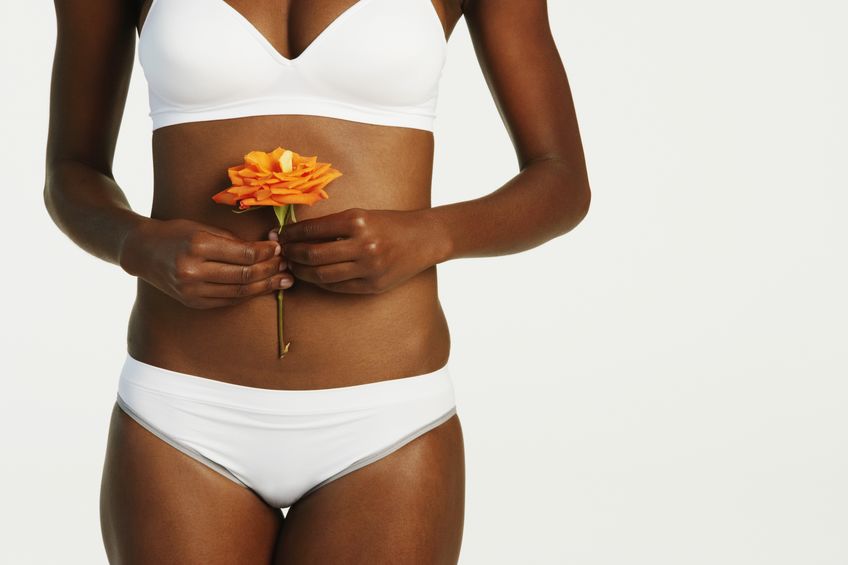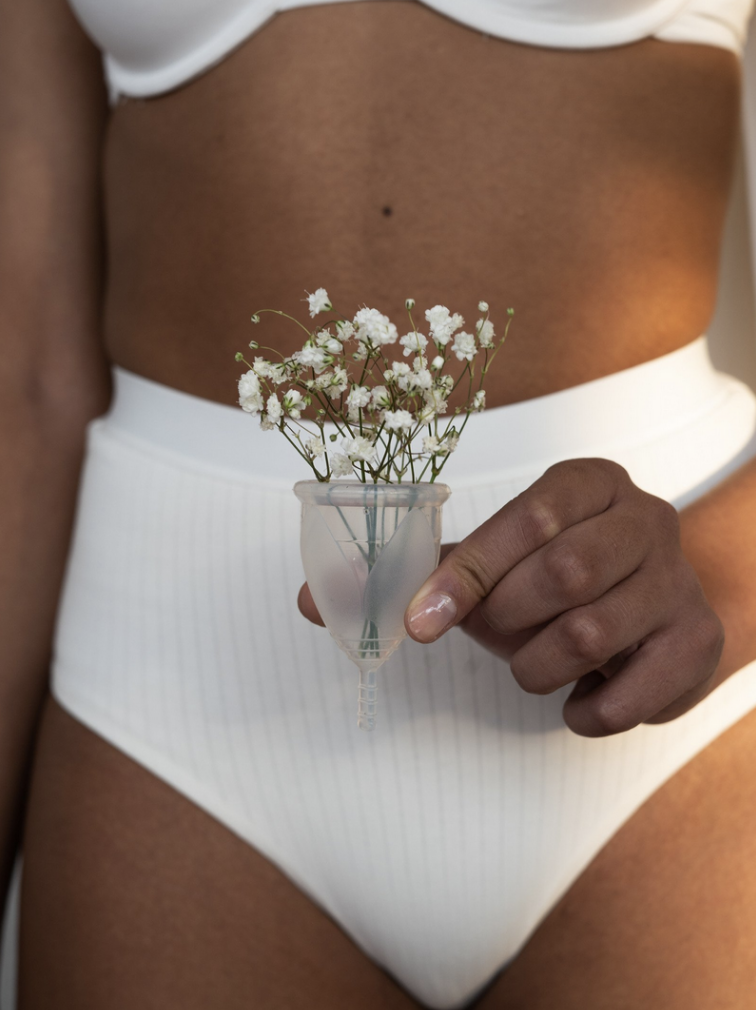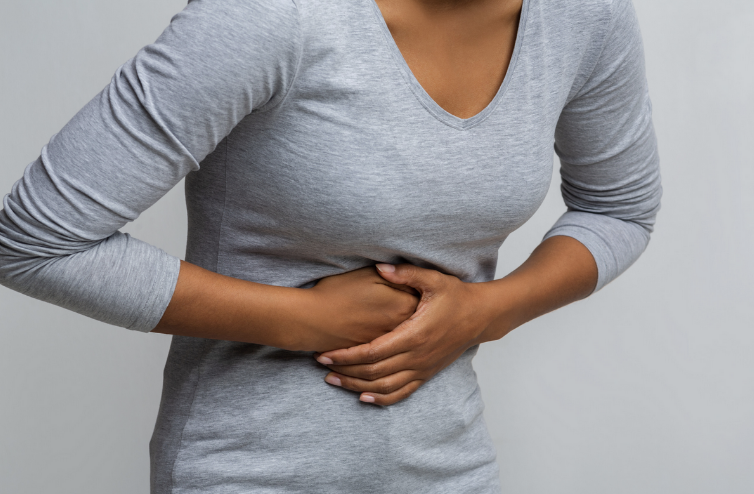What’s normal and what should you be concerned about when it comes to gynaecological or feminine issues? An expert answers everything from periods and pregnancy to discharge and pubic shaving.

Getting face to face time with a Gynae isn’t straightforward at the best of times. Often, when we have questions about our feminine health we turn to google or just let our question fizzle away. So, we weren’t going to pass up the chance to get some quality time with Dr Shree Datta, an obstetrician and gynae in-house expert for a feminine intimate healthcare brand INTIMINA.
We asked Dr Datta 10 common questions many of us have about Gynae issues and our lady parts.
How do I know if my vaginal discharge is normal?
Discharge is actually a very good sign of your vaginal health – clear or milky discharge is completely normal. It’s needed to make sure your vagina is healthy and clean and keeps the bacterial balance there in check. For that reason, internal douching of the vagina isn’t recommended, as this can actually alter the natural bacterial balance you have in your vagina. Using soap and water on the outside skin is absolutely fine. The type and amount of discharge you pass can depend on where you are in your menstrual cycle – for example, it’s often thicker and more jelly-like in the second half of your cycle.
Having said that, if you experience a persistent change in colour, consistency or smell of discharge, it’s worth getting checked over by your Gynae.
My periods are super heavy, what causes this and how can I fix it?
It goes without saying that the frequency and duration of periods varies from person to person, so it’s worth monitoring what’s normal for you.
Make a record of the number of sanitary products you are changing and if you are leaking through them. Remember, the type of sanitary wear you are using may make a difference – period cups are great for monitoring your period flow for example, you may need a large menstrual cup for the first two days of your period and a smaller one for the other days.
Having long heavy periods – with flooding, clots or heavy bleeding with hourly or two hourly changes – would suggest it’s a good idea to get checked over by your Gynae. Things that I would be thinking about that may be causing heavy periods include fibroids and polyps, which can grow in your womb. Sometimes you may be on medication which can alter the flow of your periods or have a hormonal imbalance in your thyroid so these are other things we would check for.
If sex has always been problematic, it’s worth seeking help to see whether there is an underlying physical or emotional connection.
It’s painful to have sex – why?
Believe it or not, it’s common to find sex uncomfortable at some point in time and there’s a pretty long list of possible causes. It could be as simple as having sex for the first time with a new partner, feeling stressed or trying a new position. You might find sex more uncomfortable at certain points of your menstrual cycle or need more lubricant. Medical problems such as infections, fibroids or endometriosis may also cause sex to be painful, so it’s important to see your doctor if sex is persistently uncomfortable. If sex has always been problematic, it’s worth seeking help to see whether there is an underlying physical or emotional connection.

Why do I need to pee so often?
Going to the toilet to wee over eight times in a day can be incredibly disruptive to your lifestyle. Firstly, I would take a look at how much alcohol and caffeine you’re taking in, as well as how much water you’re drinking. Remember, if you don’t drink enough water, your urine is more concentrated and this can irritate the bladder leading you to go to the toilet more often. You may also have a urine tract infection, or an overactive bladder. Certain medicines or medical conditions – including constipation – can affect how often you’re going to the toilet. As well as this, anything that puts pressure on your bladder – a fibroid in your womb or pregnancy, for example, can also lead to frequent urination. After monitoring your fluid intake and the number of times you go to the toilet, it’s time to see your doctor for further investigations to find out the exact cause and correct treatment. You might also benefit from strengthening your pelvic floor muscles, which support the bladder, bowel and affect sexual function, by regularly doing kegel exercises.
I keep getting bleeding in between my periods and after sex, what is going on?
There are lots of reasons why you might get bleeding in between your periods or after sex, but to help clarify the cause, note down when you get the bleeding, how heavy it is and how long it lasts in relation to your periods. Remember, it’s not uncommon to get bleeding if you’ve changed your contraception to a new pill or coil and for some women, a slight bleed at the point of ovulation (mid cycle) can be normal. Some sexually transmitted infections may cause bleeding unrelated to periods, as can stress or pregnancy. You may also have some cell changes to the neck of the womb (cervix), so make sure you have an up-to-date smear. When consulting your Gynae, we’ll also explore whether you would benefit from an ultrasound scan to look for fibroids or polyps in your womb, which can affect your period length, frequency and heaviness as well as bleeding in between periods.
Why do I need to have a smear if I’ve had the HPV vaccination?
Human papillomavirus (HPV) is a common sexually transmitted infection, with over 100 different types, which can cause warts and cervical cancer. Infection with HPV doesn’t usually cause any symptoms, so those with HPV don’t know they have the infection and it generally takes 18-24 months to clear. The vaccination programme, although effective, does not protect against all of the strands of HPV which can cause cervical cancer and you must complete the course of vaccinations on time. As the vaccine does not protect against all types of HPV, it’s still important to go for cervical smears for those over 25. Remember, a smear test is free and it can help detect any problems early, so it’s worth attending – you will usually receive a reminder from your GP to attend every three years until the age of 50, after which it’s every five years.
I haven’t had a period for three months, but my pregnancy test is negative – now what?
Apart from being pregnant, there are lots of reasons why your period may stop. A Gynae willl always go back to reviewing your period cycle and whether they were regular before they stopped. Things we think about when periods stop include a change in hormonal contraception – for example, the Mirena coil can lighten and even stop periods for some women – and stressful life circumstances, such as finals exams or a divorce. This can often affect your weight, which believe it or not, has a massive impact on your periods. So sudden weight loss, doing too much exercise or being significantly overweight can impact your periods. Medical problems such as poorly controlled diabetes or an overactive thyroid can also influence whether you get periods and how frequently. Of course, we will always check your hormones to make sure this is not the first sign of the menopause, but having an early menopause is uncommon – only 1% of women go through the menopause under the age of 40.

I keep getting pains in my lower tummy, worse leading up to my periods, what’s going on?
Whilst it’s not uncommon to get period pains, pelvic pain in the second half of your menstrual cycle and painful periods can suggest endometriosis. This is a medical condition where the womb lining is found elsewhere – often in your ovaries and around the womb as well as within it. We don’t know the exact cause, but we do know it is hormone dependent and runs in families. Endometriosis can cause regular pains, which worsen in the time leading up to and during your period. However, pain can also be due to infection or IBS, so it’s important to see your doctor to make sure the correct diagnosis is made so that we can give you the right treatment. In the first instance, keep a diary of your pain, in relation to when you are getting your periods – if the pains are not related to your periods, causes of your pain could include an ovarian cyst or IBS.
There is no need to shave or wax your pubic hair if you’re coming to see us, we’re able to examine you with or without pubic hair.
I’ve got polycystic ovaries, does this mean I won’t be able to have children?
It’s true that polycystic ovary syndrome can affect periods and in some cases your fertility – but not always. PCOS is common, affecting between 2-26 women per 100 and relates to the number of fluid-filled follicles you have in your ovaries. You may not have symptoms even if you do have PCOS; things to watch for include irregular or no periods, acne, or an increase in facial or body hair. Being overweight can also be associated with PCOS, but diagnosis depends on your menstrual regularity, blood tests and an ultrasound scan. In the longer term, PCOS can be related to other medical conditions such as diabetes, high blood pressure and changes to your womb lining, so it’s important to seek advice from your Gynae.
Should I shave if I’m seeing a Gynaecologist?
There is no need to shave or wax your pubic hair if you’re coming to see a Gynae, we’re able to examine you with or without pubic hair. The only time we may consider removing hair is if we are performing an operation on the skin around the vagina – and even then, we will only remove hair in the operating zone as is needed.












